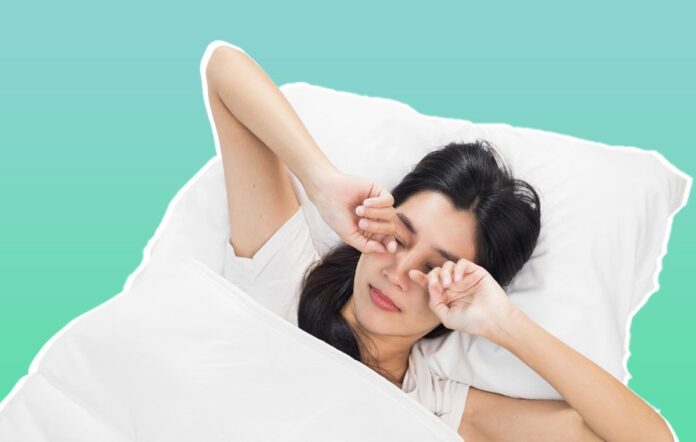Imagine you’ve just booked your dream vacation — it includes snorkeling with sea turtles, a night of dancing at the local cantina, and hiking through a lush forest. All your flights are on time and you make it to the hotel without any issues. But there’s one lurking threat that could still derail all your plans: sleep, or travel insomnia. A lousy night of sleep filled with restlessness and frequent glances at the neon red numbers on the digital alarm clock pose one of the biggest threats to a seamless vacation, work trip, or visit to see family.
Often, a night away from home and the sanctity of your own bed, no matter how comfortable the hotel or guest room mattress, has a way of disrupting sleep and plundering goals for relaxation, adventure, and connection. But there’s still hope — we have plenty of tried and true tips and tricks to help you combat travel insomnia and catch some much needed zzz’s away from home.
What Is Travel Insomnia?
Travel insomnia is a short-lived sleep problem that even frequent travelers experience. Travel insomnia sufferers often, despite their best efforts, struggle to achieve that coveted Rapid Eye Movement (REM) sleep in a new space. The first night tends to be the worst, hence the researcher-coined phrase “First Night Effect.” The idea is that a disruption in sleep patterns, environment, and even physiology can lead to a terrible night of sleep, particularly on that first night when the body and brain are adjusting to a new setting.
What Causes Travel Insomnia?
There are a number of factors that can contribute to travel insomnia beyond a lumpy pillow, jetlag, and loud sounds. One study examined a focus group of people sleeping in a new environment across two sleep sessions. The researchers determined that during the first night, half of the brain remained active in most participants. This suggests that one brain hemisphere remains alert to process and react to sounds of danger or threat. In unfamiliar situations, our brains refuse to shut off entirely, as it would in the safety of our own homes, because our subconscious is not totally at ease in a new environment. This effect typically subsides the longer a person stays in the new location, and subjects woke twice as often on night one as night two.
Trouble sleeping in a new space can also be a matter of comfort and consistency, or lack thereof. A change in sleep schedule, lighting and sound, temperature, and sleep accessories can all contribute to sleep woes.
“The pillow is very important,” said Mike Rajaee, manager of Los Angeles-based All Care Sleep Center with nearly a decade of experience in the sleep industry. “Your head needs to be in the same position as when you sleep at home. I take my pillow with me because when you’re sleeping and if you have any issues with apnea, the shape of a new pillow could cause problems breathing normally.” Rajaee says mirroring conditions of your home bedroom also supports improved quality of sleep. Obstructed airflow created by new conditions, says Rajaee, is one of the biggest contributors to disruptions in sleep. Whether the culprit is an overstuffed pillow or a drafty air conditioning unit, finding neutrality in breathing is key. “When you don’t get enough oxygen, your brain tells you to wake up. If you don’t wake, your heart will compensate and begin pumping faster, which will keep you up.”
Tips for Overcoming Travel Insomnia
The travel experience can hinge on a restful night of sleep, and being proactive can be the difference between having a great time or feeling like a sleep-deprived zombie. These tips are intended to support sound sleep, even on that first night away when the body is working over time to stay alert.
- Routine: Try to get to bed and rise in the morning at your usual time, sleep on the same side of the bed, and keep your usual bedtime routine intact. Consistency is key.
- Sleep accessories: Bring your own pillow and pack pajamas that you are comfortable wearing. Create a sense of familiarity, which will help put your mind at ease.
- Hotel choice: When choosing your accommodations, consider the proximity to loud traffic from highways or airports. Opt to stay at a location that’s removed from the hustle and bustle of the city commute.
- Room selection: Request a room that’s away from the noisy main lobby, elevators, pool, or kitchen/bar area.
- Breathing device: For those with sleep apnea, bring along a portable sleep apnea machine. Some models are pocket sized and take up little space.
- Climate and circulation: Adjust the room temperature to a cooler setting and use the AC unit to create circulation of the air. Experts say a setting of 60-67 degrees Fahrenheit will allow your body to keep a core temperature that’s most suitable for sleep. Be sure to take other factors into account as you choose your temperature—the thickness of your comforter, type of pajamas, and outside climate can all play a part in temperature selection.
- Snacking habits: Late night meals can keep the body awake and digesting food instead of lulling you to sleep. Snacks that are high in sugar content can cause a spike in energy—not ideal at bedtime!
- Limit screen time: Researchers found that blue light from phones, laptops and TV screens late at night can signal the brain to stay awake. Practice putting away technology an hour or more before you intend to go to sleep.
- Save the bed for sleep: Research shows that working from bed creates an association between bed and work that can lead to challenges falling asleep. Keep the bed a sacred space for sleeping and complete work and other tasks from the desk or couch.
- Avoid night caps: A little alcohol before bed may help us get to sleep, but studies show once alcohol has metabolized, sleep during the second half of the night is disturbed.
Last Word from Sleepopolis
Whether you’re touching down in a new city a thousand miles away or pulling up to a hotel that’s just a short drive from your home, a new place will likely influence the quality of your sleep.
Creating a comfort zone that mimics the layout of your home bedroom, reducing noise and distractions, and maintaining a consistent routine can improve sleep. A successful and enjoyable trip is best achieved with a full night of sleep and with a proactive approach, you can focus on making memories instead of counting sheep.
Subscribe Today!
Get the latest deals, discounts, reviews, and giveaways!
Aja is an Ohio native living in Los Angeles, where she fills her days with reading, exploring the outdoors, tracking down great food, and making art. She graduated from Ohio State University and considers herself a lifelong student because she loves learning about new things. A former television news journalist, Aja enjoys reporting across various mediums and has fun capturing video and photos of her experiences.













